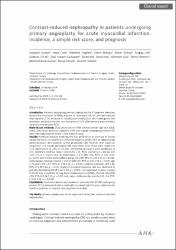Contrast-induced nephropathy in patients undergoing primary angioplasty for acute myocardial infarction: incidence, a simple risk score, and prognosis

View/
Access
info:eu-repo/semantics/openAccessDate
2009Author
Uyarel, HüseyinÇam, Neşe
Ergelen, Mehmet
Akkaya, Emre
Ayhan, Erkan
Işık, Turgay
Çiçek, Gökhan
Günaydın, Zeki Yüksel
Metadata
Show full item recordAbstract
Introduction: Patients undergoing primary angioplasty for ST-segment elevation myocardial infarction (STEMI) may be at increased risk of contrast-induced nephropathy (CIN) because of inadequate prophylaxis. We investigated the incidence, predictive factors, and outcomes of CIN after primary percutaneous coronary intervention (PCI).
Material and methods: 2521 consecutive STEMI patients (mean age 56.5 +/-11.8, years, 2091 male, baseline creatinine 0.97 +/-0.3 mg/dl) undergoing primary PCI were retrospectively enrolled in the present study.
Results: Contrast-induced nephropathy was defined as an increase in serum creatinine level >= 0.5 mg/dl or >= 25% from baseline within 72 h of radiocontrast administration. 630 patients (25%) developed CIN. Patients with baseline creatinine > 1.5 mg/dl developed CIN more often than those with creatinine <= 1.5 mg/dl (45.9 vs. 24%, p < 0.001). The following factors were predictors of CIN: diabetes mellitus (odds ratio [OR] 1.34, 95% confidence interval [CI] 1.03-1.75; p = 0.03), time to reperfusion >= 6 h (OR 1.46, 95% Cl 1.07-2.00, p = 0.02), use of intra-aortic balloon pump (OR 2.46, 95% Cl 1.30-4.67, p = 0.006), radiocontrast medium volume > 250 ml (OR 1.34, 95% Cl 1.01-1.78, p = 0.04), age >= 75 years (OR 2.07, 95% Cl 1.36-3.12, p = 0.001), anterior infarction (OR 1.26, 95% Cl 0.99-1.60, p = 0.05). Higher in-hospital mortality rate was observed in patients developing CIN (9.5 and 1.2%, p < 0.001). Cox regression analysis showed that CIN was a predictor of long-term cardiovascular mortality (hazard ratio [HR] 1.90, 95% Cl 1.16-3.12, p = 0.01) and major cardiovascular events (HR 1.34, 95% Cl 1.04-1.72, p = 0.025).
Conclusions: Contrast-induced nephropathy in patients with STEMI undergoing primary PCI is associated with a markedly increased risk of major cardiovascular events as well as in-hospital and long-term mortality.

















